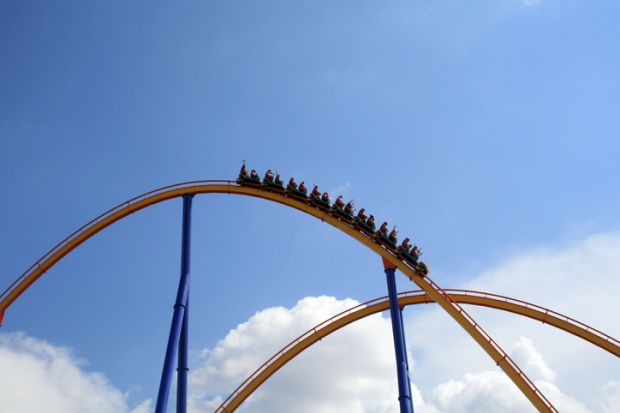“Business as usual” practices risk relegating Australian research and development spending to 1980s levels and jeopardising national prosperity, the country’s research-intensive universities have warned.
A Group of Eight (Go8) report says Australian R&D investment cannot meet global norms without “substantial” change to policies that saw investment levels decline from a peak of about 2.2 per cent of gross domestic product (GDP) in 2009 to less than 1.7 per cent today.
The report says the current trajectory is for R&D spending to slump to about 1.2 per cent by the end of next decade – a level last experienced in the late 1980s. This would counter the trend across the Organisation for Economic Cooperation and Development (OECD), where investment has risen steadily for about 30 years.
The OECD average is now above 2.7 per cent. An “optimal level” for Australia would be almost 3.7 per cent, the report says.
In a 10-year “roadmap”, the Go8 outlines mechanisms to boost spending levels to 3 per cent of GDP. They include tweaks to tax incentives and skilled visas, measures to encourage R&D investment by pension funds and a “life-cycle” approach to national research infrastructure funding.
Australia should also increase PhD stipends, boost funding for STEM degrees, join global research collaboration schemes and revise the “template agreements” governing intellectual property arrangements between businesses and universities, the report says.
In the longer term, the report recommends a new future fund for non-medical research, free access to government-funded research publications and programmes to foster the co-location of universities and businesses.
But the first step would be to formally adopt a 3 per cent target by 2035 and report annually on progress towards the target. Go8 deputy chief executive Matt Brown said the “ambitious time frame” was “definitely doable”, but not without “fundamental restructures” and lots of work. “We need to be pulling as many different levers as we can.”
Australia ranks relatively lowly on R&D spending and is easily the worst performing OECD nation in Harvard University’s economic complexity index, which assesses the diversity and sophistication of each country’s export industries. Dr Brown said economic complexity was a proxy for economic robustness and resilience.
“Less demand for digging things up out of the ground – coal and things like that – is going to impact every Australian family [unless we] develop sophisticated, high-tech industries … which are by and large reliant on innovation and research,” he said. “It’s going to be really difficult if [we] don’t have the R&D base to support that sort of high-tech industry.”
While the governing Labor Party has had a longstanding aspiration to lift R&D spending “closer to” 3 per cent of GDP, it has never articulated how it intends to achieve the goal. Last year it considered dropping the target from its policy platform and quietly withdrew from negotiations to join Horizon Europe, the world’s biggest research collaboration scheme.
According to figures published last year, R&D investment as a proportion of GDP is at a 17-year low and the government’s share is the lowest on record. Higher education is the only sector to substantially increase its contribution, boosting its R&D spending by about one-third between 2014 and 2022, but its major source of research funding has now been jeopardised by the government’s crackdown on international education.
The Go8 says the report is the product of over six months of research and workshops with experts. “The bulk of the work was done before we had this possibility of caps on international students,” Dr Brown said. “Clearly, that’s going to make things worse.”
Register to continue
Why register?
- Registration is free and only takes a moment
- Once registered, you can read 3 articles a month
- Sign up for our newsletter
Subscribe
Or subscribe for unlimited access to:
- Unlimited access to news, views, insights & reviews
- Digital editions
- Digital access to THE’s university and college rankings analysis
Already registered or a current subscriber?








